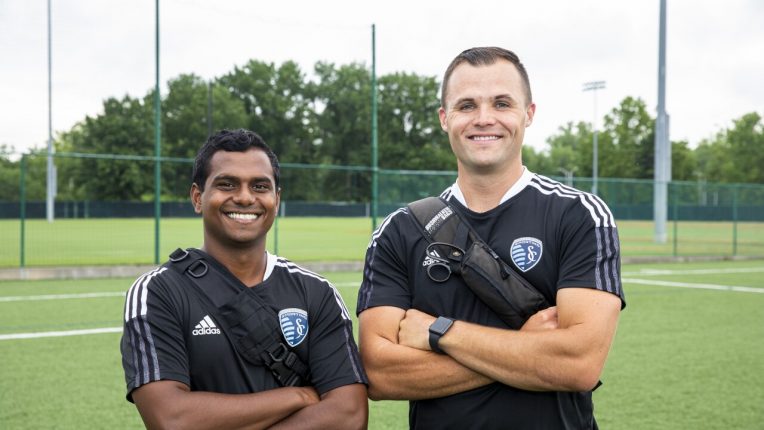As an academy athletic trainer for a Major League Soccer club, no two days are alike for Payton Jensen ’17. He is primarily responsible for the U17, U14, and U12 teams, and aids the 1st and 2nd teams when they are in need.
“I am the primary health care provider for the academy teams and work very closely with Children’s Mercy Hospital physicians to provide well-being for these developing athletes,” he said. Jensen lives and works in the Kansas City area.
As an athletic trainer, Jensen has seen countless broken bones, sprains, strains, and a few dislocations. While he was in graduate school, a student athlete had a severe allergic reaction that required an EpiPen to be administered. He’s used to thinking on his feet and making quick decisions that allow him to help people. However, earlier this summer, he experienced a day unlike any other.
Jensen and his colleague Karan Padmakumar were on the sidelines of a soccer game that was about to start when the referee collapsed and began seizing. The two athletic trainers, along with the athletic trainer from the visiting team, jumped into action.
“This was the first time I have had to perform CPR and utilize an AED,” Jensen said. “In the moment, it was very intense, but I felt a sense of calm. I knew right away that it was going to be an emergency situation as I was running out to the collapsed man. Clear decision making, constant communication, and the thought of what’s next ultimately made the situation run efficiently. Fine tuning the craft with the obligation to stay up to date on our CPR/AED courses and practice of the Emergency Action Plan are a testament to the outcome we received that day.
“When I explain the story, I feel as if it happened in the blink of an eye, but when actively in it, I felt isolated in the middle of the field for 12 minutes with all eyes on us,” he said. “It felt like an eternity.”
Jensen and the other athletic trainers saved the referee’s life due to their calm, quick thinking and confident decision making.
“All in all, I was very blessed that in this situation,” he said. “I had a team around me that was appropriately trained to provide the care needed to save this man’s life.”
As an advocate for the profession, Jensen is hopeful that this event can shine a light on what an athletic trainer does and the significance of having them on site for all athletic events.
“Athletic trainers save lives,” he said. “Overall, athletic training is an underappreciated, overworked, undercompensated, and highly misunderstood profession. It takes hours upon hours of training and experience to have the skill set and knowledge base to be able to perform under pressure when these types of scenarios arise. I am very humbled and appreciative for my past experiences, clinical hours to learn the techniques, and all of the other athletic trainers I have met along the way who have helped me get where I am now.
“My main message to any up-and-coming athletic trainers is to take care of yourself first. It may sound selfish, but work-life balance is extremely important in how effective we perform on a day-to-day basis. With this being a service-based profession, it is very important to serve you as much as you do the others you care for daily.”
Originally interested in coaching or a physical education teacher degree, Jensen was hooked once he realized what kind of impact he could have as an athletic trainer.
“I knew I wanted to be involved in sports, and I enjoyed helping people,” he said. “Athletic training allows you to do both. You get the benefit of being in a sports environment, all while being able to increase and enhance athletic performance through injury prevention and rehabilitation.”
Once he chose a major, heading to Illinois State University was an easy choice for this legacy. His father, Jason Jensen ’93, was also a Redbird.
“In addition to that, when I completed my campus visit, the facility was top notch compared to other universities, specifically the athletic training department,” Jensen said. “Choosing to become a Redbird was the greatest decision that I’ve made.”
Athletic training is part of the School of Kinesiology and Recreation.

